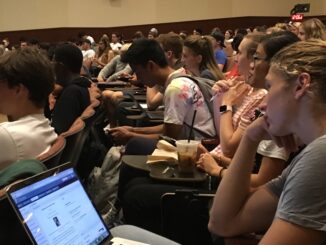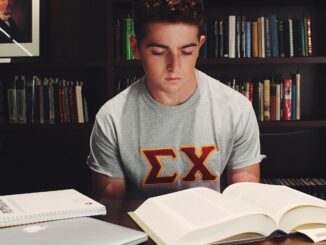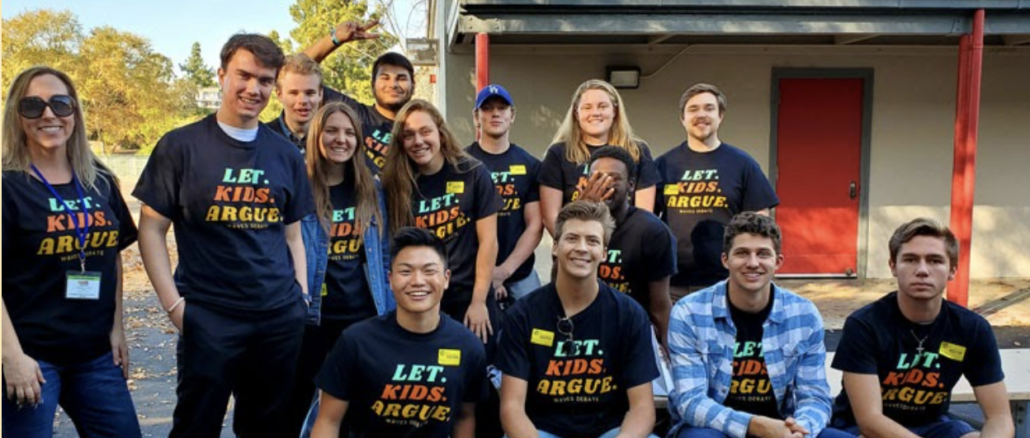
Pepperdine Waves Debate attends competitions, debates on an international level and uses their public speaking skills to educate and empower America’s youth.
Pepperdine students have been coaching kids at Woodlake Elementary Community Charter School since 2016, teaching them how to debate civilly. This is what makes Pepperdine debate stand out as they are one of the few programs that don’t solely debate other schools. Instead, they have a program set up to teach kids how to have disagreements, and how to support an argument with evidence.
“They can use their voice to make change,” said Abi Smith, the director of Debate and a communication professor. “That for me is so moving, that is when I most feel like God’s hand is on my back.”
Waves Debate has expanded their Let’s Argue program to serve five schools in Los Angeles. After years of time-consuming policy competitions that limited who could participate, Waves Debate shifted to British Parliamentary and Civics style debate, which opened the door for more students to participate and for the service work.
Let’s Argue
The idea for the Let’s Argue program came to Smith on a treadmill at the gym. A woman asked her what she did, and when she shared that she worked for Pepperine’s debate team, the woman said she wished they had something like that at the elementary school for students to learn those skills early on.
Waves Debate started working with fifth graders, teaching students how to partake in civil, evidence-based debates. It is a passion project for Smith as she believes that they have a duty to empower the voice of children.
“A lot of the students that sign up initially are already very vocal in class and are so enthusiastic about sharing their opinion,” Smith said. “We emphasize the importance of listening to others and listening to others quite a bit.”
The students who are really shy and reserved end up finding their confidence through the program, Smith said.
The program is in its fourth year. It initially started out as an eight-week program, but grew to be a year-long, Smith said. It has expanded to four new schools this year, mostly serving the Woodland Hills community.
<iframe width=”960″ height=”729″ data-original-width=”1420″ data-original-height=”1078″ src=”https://www.thinglink.com/card/1371183116948865027″ type=”text/html” frameborder=”0″ webkitallowfullscreen mozallowfullscreen allowfullscreen scrolling=”no”></iframe><script async src=”//cdn.thinglink.me/jse/responsive.js”></script>
Another benefit of this program is that it teaches students that no matter what they lose, they will always have their voice, Smith said.
The value of the program to students is immense. The real world of business regularly requires collaboration, problem solving and public presentation of results, Stanley Ridgley wrote in the book The Complete Guide to Business School Presenting.
Debate nurtures students’ critical thinking skills and awareness of thought, and helps facilitate clinical reasoning and the ability to share viewpoints with others while learning, Michele Darby wrote in the book “Debate: A Teaching-Learning Strategy for Developing Competence in Communication and Critical Thinking.”
Pepperdine student experience
This program doesn’t only benefit the elementary school students, but also the Pepperdine student coaches.
“Observing those changes in young people, seeing what a difference they can make donating an hour of their expertise, can actually change their lives,” Smith said.
Learning how to voice one’s thoughts in a persuasive and understandable way is something that anyone can use, said Luke Sides, a junior communication rhetoric and leadership major. He works as a coach with Let’s Argue, where he got to work with fifth-grade student Jack.
“He was a bit hyperactive, but I had the same thing as a kid so I understood,” Sides said. “I helped coach him on how to speak properly, and I did this with all the kids, but I worked with Jack more because I was hyperactive too and understood him.”
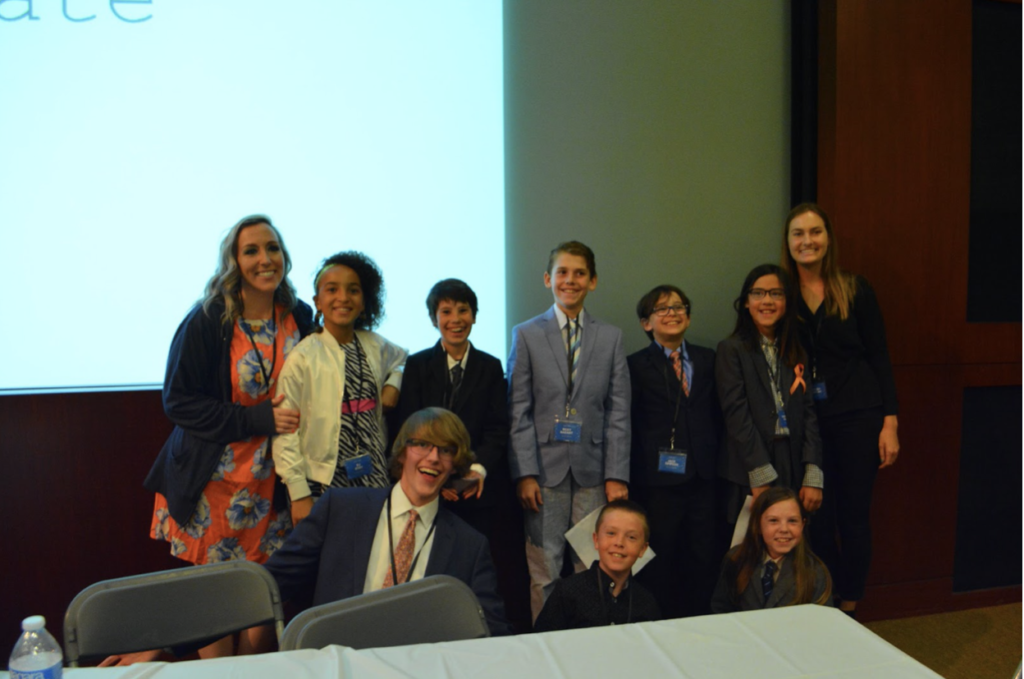
Christian Parham, a junior political science major, is also a coach in the program. She works to teach the kids the fundamentals of debate and help them with their public speaking skills.
“As a coach, I’m there to serve as a mentor to talk to students about debate, different forms of debate, and help them get more comfortable in expressing their opinions,” Parham said.
Parham partnered with AJ Muonagolu, a sophomore psychology pre-med major and head volunteer, and Arabella Crites, a freshman psychology major and volunteer. She said Muonagolu would teach the main points, and they would help lead the class, discussion and games.
One of the more interesting interactions she had was with a very outspoken student named Brycen. Parham said she worked with him to help him speak in a more constructive way, as some of the things he said were destructive.
“The debate team really just helped me to feel more confident in what I believe in and to stand for that,” Parham said.
Pepperdine tries to model service leadership, and if students don’t get out and actually do it, they get caught up in their own lives, said Samantha Miller, the vice president of Let’s Argue and a junior biology major.
“I really got to see these students learn for themselves and advocate for themselves,” Miller said. “It was so empowering to see other people empowered by debate.”
Alexandra Williams, a fifth grade teacher and sponsor of Let’s Argue, helped to get the program running at the Woodlake Elementary Community Charter School. She would hold presentations in her class, and students would sign up to learn what it means to be a good debater from Smith.
“I wanted to be a sponsor because I was really passionate about it, I love getting to see students really shine,” Williams said. “Kids about to go to middle school really have something to say, and it is important that they learn how to have different opinions from friends, and that it is OK, and learn how to support things with evidence.”
The ability of the Pepperdine students to teach these younger kids the skills of debate truly shows their mastery in the subject, Williams said.
Shift in the program
Initially, Waves Debate was focused on competitive policy debate, said Sarah Stone Watt, divisional dean of Communication and former debate director. They integrated Pepperdine’s mission and values by allowing students to make arguments on policy and social change.
The team decided to switch because it takes about a master’s thesis worth of work to be competitive in policy debate, StoneWatt said. It was a lot of work for students to complete, and it was a big operation for not a lot of students.
The focus on policy debate also saw student numbers dwindle, Smith said. They needed to find something that fit the needs of the students.
That’s why they switched to British Parliamentary and Civic style debate, as the team didn’t need many coaches and students could build on coaching one another. There are now around 60 people on the roster, as the team has grown exponentially because of this change, Smith said.
Smith joined Waves debate as the assistant director in 2012, and took over the team when Stone Watt became divisional dean.
“We needed someone who understood the various types of debate,” Stone Watt said. “I knew she cared about the students and cared about building those relationships.”
Stone Watt said Smith has helped the current team be a close group.
“Something that is really important to recognize is that Waves Debate is a family,” Smith said. “It’s really important that we create a space where everybody interested in debate in anyway can come and join our family.”
Competitions
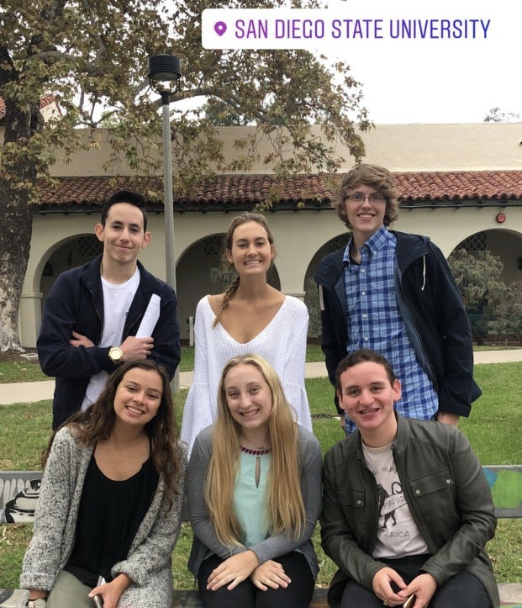
Waves Debate takes part in multiple competitions throughout the year. They’ve debated all over the state, Washington D.C., Virginia, Amsterdam, Thailand, and wherever they can find debates they can afford, Sides said.
“The debate team travels a lot for tournaments, meeting people from different countries, and growing their network,” said Ishaan Mehta, a sophomore pre-law political science and sociology major.
In British Parliamentary debate, there are four teams, each consisting of two speakers, according to the World Universities Debating Championship. There are two teams on each side, with one side having an opening proposition and closing proposition (for the motion/argument), and the other side having an opening opposition and a closing opposition (against the motion/argument).
“Civic debate is a research-based competition providing students with opportunities to contribute policy solutions for a global civic society, and develop professional presentation and leadership skills,” according to Patrick Henry College.
Unlike British Parliamentary style, Civic-style is set on a specific topic. This style of debate is something that Sides said he appreciates, as he believes that they get more time to build a strong case for something they know more about.
The team’s competitions in Civic style debate have been going great so far, Mehta said. Prior to COVID-19, they went to tournaments fairly often, at least twice a month.
Pepperdine was planning to host a tournament in the upcoming school year in partnership with the University of Miami, Sides said. They also try to go to one or two international tournaments every year.
“Learning how to voice your thoughts in a persuasive and understandable way is something anyone can use,” Sides said.
Nicolas Armenta completed the reporting for this story in Jour 241 in Fall 2021 under the supervision of Dr. Christina Littlefield and Dr. Theresa de los Santos. Dr. Littlefield supervised the web version of the story.


